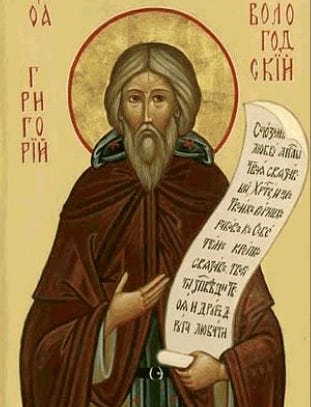Because of the Fall of man, the natural order of things has become chaotic. In nature, there is an order for all things, but with man there is chaos, Everything is distorted and turned around. Because of our disobedience to the commandments of our Heavenly Father, we have lost the natural order. In order to reestablish this order, we must practice abstinence.
+ Elder Thaddeus of Vitovnica, Our Thoughts Determine Our Lives
Daily Scripture Reading
Galatians 2:11-16 (Epistle)
11 Now when Peter had come to Antioch, I withstood him to his face, because he was to be blamed;
12 for before certain men came from James, he would eat with the Gentiles; but when they came, he withdrew and separated himself, fearing those who were of the circumcision.
13 And the rest of the Jews also played the hypocrite with him, so that even Barnabas was carried away with their hypocrisy.
14 But when I saw that they were not straightforward about the truth of the gospel, I said to Peter before them all, “If you, being a Jew, live in the manner of Gentiles and not as the Jews, why do you compel Gentiles to live as Jews?
15 We who are Jews by nature, and not sinners of the Gentiles,
16 knowing that a man is not justified by the works of the law but by faith in Jesus Christ, even we have believed in Christ Jesus, that we might be justified by faith in Christ and not by the works of the law; for by the works of the law no flesh shall be justified.
Luke 6:24-30 (Gospel)
24 But woe to you who are rich, for you have received your consolation.
25 Woe to you who are full, for you shall hunger. Woe to you who laugh now, for you shall mourn and weep.
26 Woe to you when all men speak well of you, for so did their fathers to the false prophets.
27 But I say to you who hear: Love your enemies, do good to those who hate you,
28 bless those who curse you, and pray for those who spitefully use you.
29 To him who strikes you on the one cheek, offer the other also. And from him who takes away your cloak, do not withhold your tunic either.
30 Give to everyone who asks of you. And from him who takes away your goods do not ask them back.
Venerable Gregory, Abbot of Pelsheme and Wonderworker of Vologda
Saint Gregory of Pelsheme, Vologda, was born in the city of Galich, Kostroma governia. He came from the line of the Lopotov nobility. When the youth reached age fifteen, his parents wanted him to marry, but they died, without seeing this come to pass. Young Gregory distributed the inheritance left him to the poor, and entered the monastery of the Most Holy Theotokos on the shore of Lake Galich.
The Igumen of the monastery regarded the new monk with mistrust because of his youth and noble parentage. Therefore, he placed Gregory in obedience to an experienced Elder. With great humility Saint Gregory served all the brethren. After a certain while he was ordained a priest. Soon Saint Gregory’s fame as a pastor spread, and many began to arrive for spiritual guidance and counsels.
The Galich prince asked the monk to be godfather for his children. Burdened by fame and the nearness of his relatives, the monk went to Rostov to venerate the relics of Saint Leontius (May 23), and he settled in the monastery of Saint Abramius, (October 29). But here also news of the saint’s ascetic feats quickly spread.
The monks of the Savior (Yakovlev) monastery turned to Archbishop Dionysius of Rostov (1418-1425) with a request to assign Saint Gregory to head their monastery. Out of humility the monk accepted the guidance over the monastery, but after two years he secretly left the monastery and withdrew into the Vologda forest.
The Sign of Sincere Love
It is no surprise then that the gospel reading speaks of forgiveness in these terms of debts and payments. But the truth is that it is easy to speak about forgiveness. It is easy to imagine ourselves being forgiving people. But in reality it can be very very difficult to forgive others. The more difficult it is for us to forgive others, the more it is a sign of the hurt and pain that they have caused us. But here is the rub, the more hurtful that the actions of someone have been towards us, the more important it is for us to focus on the task of forgiving them. Why? Because the pain and the resentment that you feel towards that person is a sign of the space they have taken up in your heart. But if we don’t remove that resentment from our hearts, there is no space left for God.
Sometimes we want people to make things right. To restore what they have taken from us. Sometimes we want them to apologize. Sometimes those things happen. Sometimes people go out of their way to ask forgiveness and to try and correct situations where they may have offended others. But guess what? Sometimes, that doesn’t happen. So what do we do with that as people of God? Well, what would God do? Rather, what has God done?
When we look at the image of our Lord Jesus Christ crucified we are granted the gift of seeing love incarnate, mercy incarnate and yet forgiveness incarnate. Forgiveness made flesh. You pray and you tell God that it is difficult to forgive others and He alone can stare back at you and agree with you. Forgiveness is difficult. Yet the heart of Jesus Christ was filled with with divine mercy and forgiveness for all of mankind, even those who were involved with His betrayal and crucifixion, even those who stand around at the cross and mocked Him while He was in the midst of the most brutal suffering imaginable. So God understands forgiveness. He understands what He asks and demands of us as His children. And as we focus our eyes on Him we find the strength and the courage necessary to heal and to reflect this forgiveness because we know that from the depths of our heart, we needed Christ’s forgiveness. Each one of us has sinned. Each one of us has sometimes hurt others either in deed or word or thought. Each one of us has had moments when we are less than perfect. Each of us has had moments where we made enemies of others or we were enemies of God.
Today in the Orthodox Church we celebrate the memory of one of the great saints, Moses the Ethiopian. Can I tell you something? He was a terrible human being. He was a gang leader, a murderer, a thief and who knows what else. Yet one day the love of Christ somehow reached in through the smallest crack in his stone heart, and a change began to take place. Here we are more than 1600 years later and we still speak about this man who lived in the middle of the Egyptian desert. Why? Because this man Moses, knew that God had forgiven him so much and he reflected this sense of gratitude for God’s love and forgiveness for the rest of his life. His life was truly transformed and he radiated the love and mercy of a God who had forgiven him of every terrible, rotten and sinful thing he had ever done. How could he not be transformed by such forgiveness?
This week’s calendar reminders:
Monday 9/30: Matins 8:30 a.m.; Vesperal Liturgy 6:30 p.m.
Tuesday 10/1: no services or events
Wednesday 10/2: no services or events
Thursday 10/3: Matins 8:30 a.m.
Friday 10/4: Matins 8:30 a.m.
Saturday 10/5: Catechumen Class 4:30 pm; Choir Rehearsal 5:00 pm; Great Vespers 6 pm
Sunday 10/6: Divine Liturgy 9: 15 a.m., Life Wires











